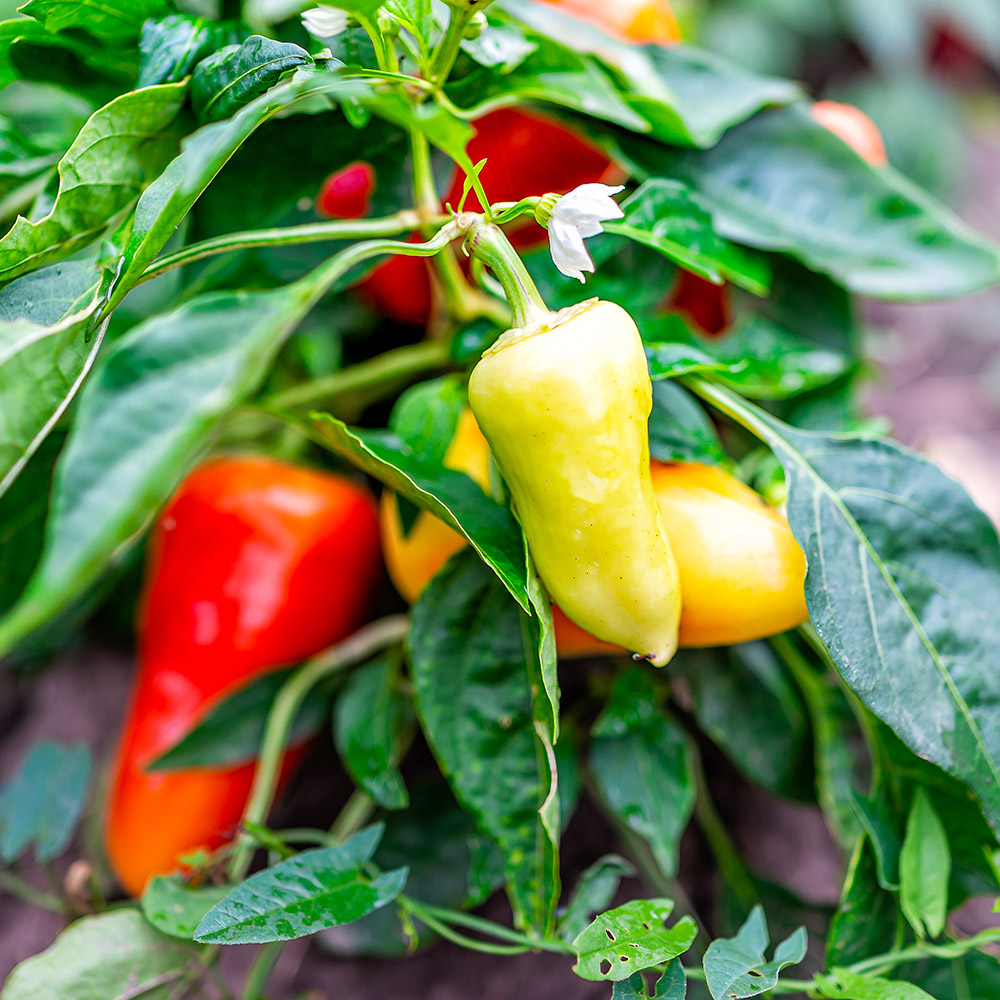Best Fertilizers for Peppers: A Comprehensive Overview to Boost Your Harvest
Best Fertilizers for Peppers: A Comprehensive Overview to Boost Your Harvest
Blog Article
Organic Vs. Synthetic Fertilizers: Which Is Best for Supporting Healthy Pepper Plants?
In the world of nurturing healthy and balanced pepper plants, the selection between synthetic and organic fertilizers stands as an essential decision with far-reaching ramifications. While both alternatives goal to give vital nutrients to support plant growth, the subtleties of their effect on the soil, plant wellness, and the setting trigger a dispute that mirrors throughout the gardening area. Recognizing the distinctive advantages and potential challenges of each fertilizer type is important for pepper farmers looking for to optimize their yields while keeping an eco-conscious and lasting approach.
Advantages of Organic Plant Foods
Organic plant foods use an environmentally-friendly and lasting strategy to beneficial pepper plants, providing necessary nutrients without making use of synthetic chemicals. These all-natural fertilizers are acquired from natural resources such as compost, manure, bone meal, and algae, advertising soil health and wellness and biodiversity. Unlike artificial fertilizers, natural alternatives launch nutrients slowly, making certain a constant and balanced supply for pepper plants to thrive.
One significant advantage of natural fertilizers is their ability to enhance dirt framework and water retention. By improving soil health and wellness, organic fertilizers advertise beneficial microbial activity, which helps in nutrient uptake by pepper plants. Furthermore, natural plant foods lower the threat of chemical run-off, securing water sources from pollution and protecting the setting.
Furthermore, natural fertilizers add to long-term soil fertility by advertising the growth of advantageous dirt microorganisms. These microorganisms aid damage down organic matter, releasing nutrients in a kind that is conveniently available to pepper plants. best fertilizers for peppers. By fostering a healthy soil ecosystem, natural plant foods support lasting pepper cultivation methods that profit both plants and the atmosphere
Disadvantages of Artificial Fertilizers
Artificial fertilizers, in comparison to their natural counterparts, position numerous downsides when used to nourish pepper plants, impacting both plant health and environmental sustainability. One significant drawback of synthetic plant foods is their propensity to seep nutrients from the dirt promptly. This fast leaching can result in nutrient discrepancies in the dirt, creating plants to experience from poisonings or deficiencies. Additionally, synthetic plant foods can hurt advantageous soil organisms, such as earthworms and advantageous microorganisms, interrupting the soil ecological community's balance.
Additionally, the overuse of synthetic fertilizers can contribute to water pollution. Excess plant foods not soaked up by plants can get rid of right into water bodies, bring about eutrophication, where algae blooms deplete oxygen degrees in the water, hurting marine life. Moreover, artificial fertilizers are generally stemmed from non-renewable resources, such as fossil fuels, adding to carbon discharges and environmental destruction throughout their manufacturing.
Nutrient Absorption Contrast
When comparing organic and artificial fertilizers in terms of nutrient absorption, organic fertilizers have the benefit of directory supplying a more balanced and slow-release resource of nutrients. Organic plant foods include a range of macro and micronutrients that are not just valuable for the plants yet also promote healthy soil microbial task, which assists in nutrient uptake.
In addition, organic fertilizers enhance dirt framework and water retention capacity, allowing pepper plants to gain access to nutrients much more effectively. This improved soil quality helps with root growth, making it possible for much better nutrient absorption. Artificial plant foods, although originally enhancing plant development as a result of their high nutrient concentrations, might prevent long-term nutrient absorption by derogatory soil health in time.
Environmental Impact Considerations

On the other hand, artificial fertilizers, although commonly even more right away offered and concentrated to plants, can have harmful results on the environment if not used properly (best fertilizers for peppers). Their go to my blog manufacturing requires high power inputs, resulting in greenhouse gas discharges and adding to environment adjustment. The overflow of excess synthetic fertilizers can pollute water sources, leading to eutrophication and hurting aquatic ecological More hints communities.
Best Plant Food Practices for Peppers
To accomplish this, it is vital to comply with ideal fertilizer practices tailored to the specific requirements of pepper plants. One crucial method is to do a dirt examination before applying any kind of plant foods.
An additional crucial method is to fertilize pepper plants at the correct time. Usually, peppers take advantage of obtaining fertilizer at planting and afterwards once again when they begin to blossom. Over-fertilizing can lead to vitamins and mineral inequalities and harm the plants, so it is important to follow advised application prices.
Furthermore, selecting a balanced plant food with an NPK proportion that matches pepper plants' demands is essential. Inevitably, incorporating natural and synthetic fertilizers deliberately can aid nurture healthy pepper plants while lessening ecological impact.
Verdict

Organic plant foods supply an environmentally-friendly and lasting technique to nourishing pepper plants, giving important nutrients without the usage of artificial chemicals. Unlike synthetic fertilizers, natural choices release nutrients gradually, ensuring a balanced and steady supply for pepper plants to prosper.
Synthetic fertilizers, in contrast to their organic counterparts, posture different drawbacks when used to nurture pepper plants, impacting both plant wellness and ecological sustainability. When comparing organic and artificial plant foods in terms of nutrient absorption, natural plant foods have the advantage of supplying an extra balanced and slow-release resource of nutrients.Additionally, organic fertilizers boost dirt framework and water retention capability, permitting pepper plants to access nutrients much more efficiently.
Report this page